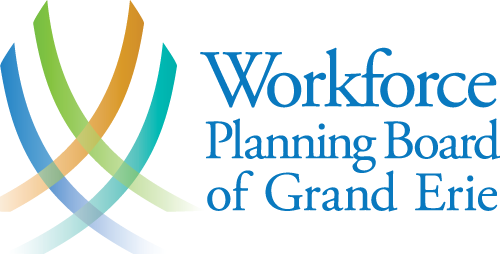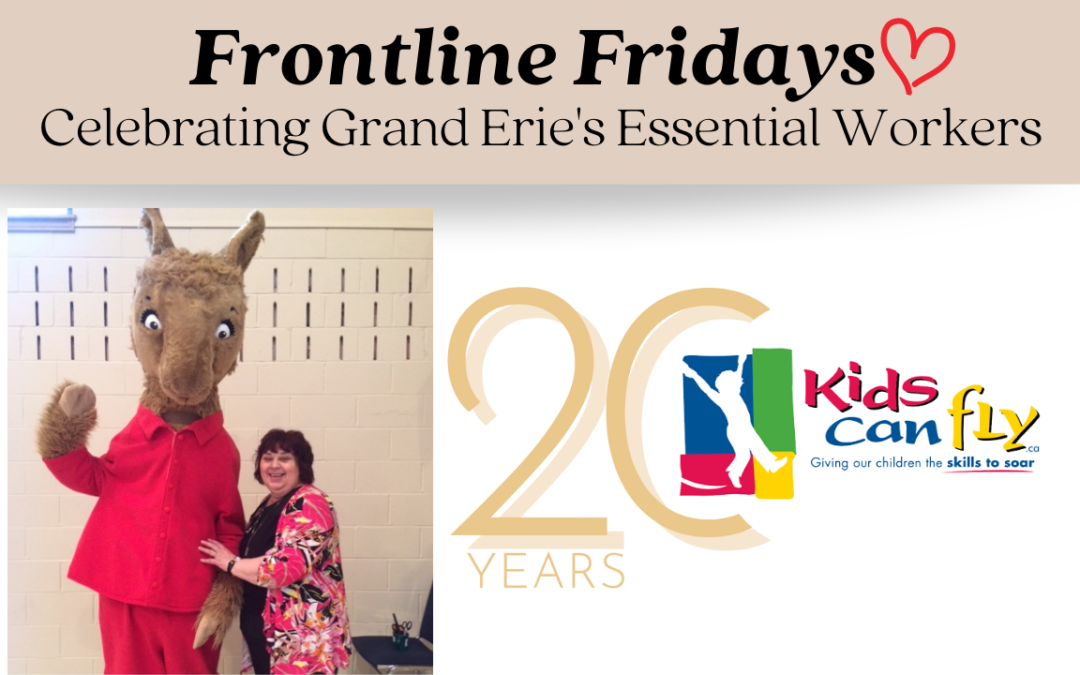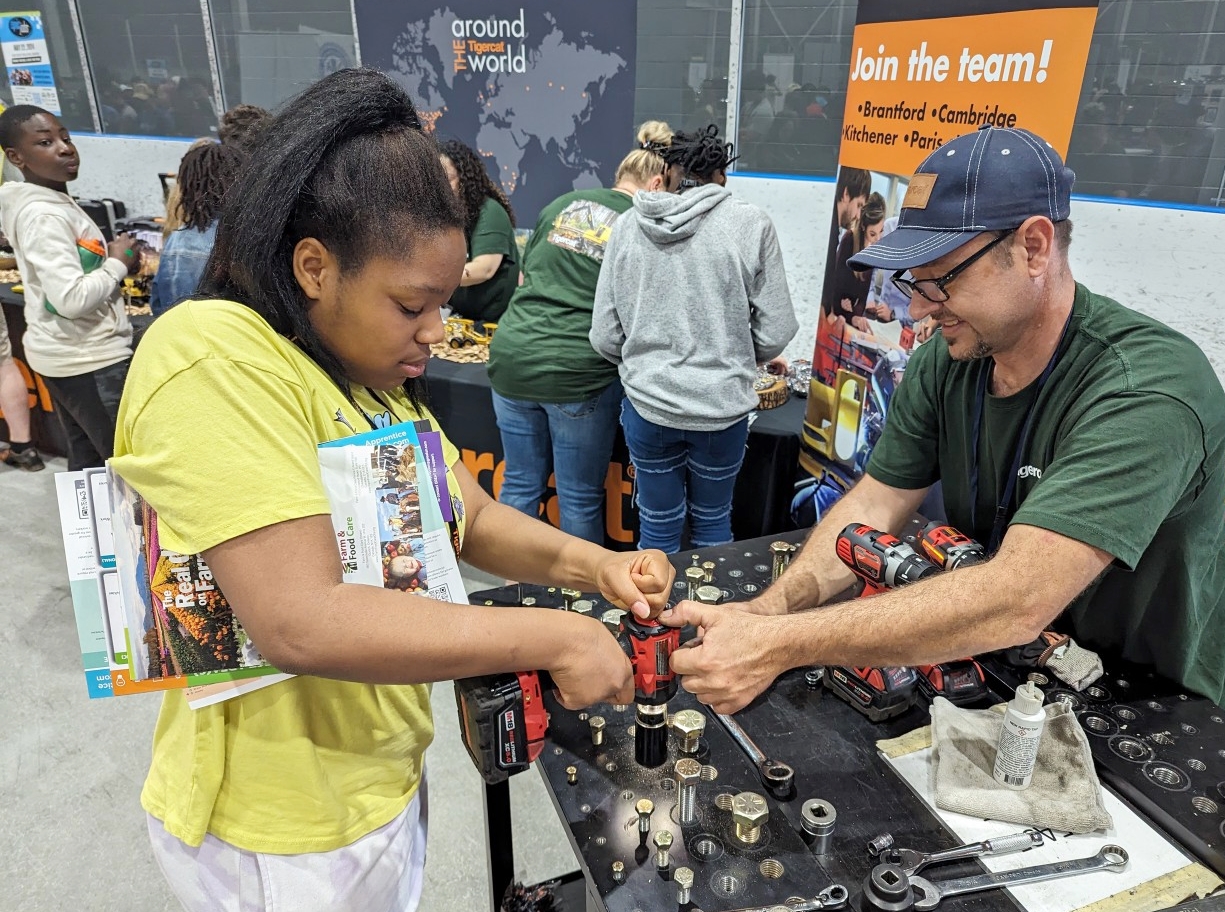Today, in our Frontline Fridays feature we talk to Sharon Brooks, Executive Director of Kids Can Fly, a local charitable organization that works with children and families supporting early learning and parenting.
Through Frontline Fridays the Workforce Planning Board of Grand Erie pays tribute to essential workers in our community. Essential workers have helped us cope with the COVID-19 pandemic in Brantford, Six Nations, New Credit, and the counties of Brant, Haldimand and Norfolk.
What is a typical day at Kids can Fly and how has Covid-19 affected your day-to-day work?
Sharon: Before COVID-19 I worked from a home office, so the change was less for me to adjust to than our programming staff.
Kids Can Fly works with children and families and our work is based on the importance of relationships. Not being able to come together in person and offer support, modeling and creative programming presented a huge challenge when the pandemic began.
Being in the Early Childhood Education (ECE) field for over 40 years, I have concerns for young children’s emotional health as they are navigated through this unprecedented time. I am overwhelmed with the resilience of children that I have witnessed and the skills and determination of ECE’s who care for them. As a charity, Kids Can Fly aims to be able to continue to offer support for parents – who need that reassurance more than ever.
When the pandemic started, our frontline staff person – Jane Flinders – who has a wealth of experience, managed the pivot to virtual programming in an amazing fashion. Jane quickly put together engaging virtual programming for children who normally attended our Launch Pad drop-in program. Songs, stories and crafts were offered via Facebook and parents were hungry to bring this normalcy to their children. Some days we have over 1000 hits and people from other communities and even other countries are joining in!
Jane’s co-host is her preschool aged granddaughter Lucy who is so relatable to the other children. Sometimes they pre-record baking or going for a walk in the woods for the children at home to enjoy. In the fall, we added to this by providing free porch-dropped Kits for Launch From Home activities which allows children to participate in crafts, musical activities and get other home ideas from the newsletter we include.
Kids Can Fly offers weekly programs for the 1 in 5 women who experience postpartum depression or anxiety. During COVID-19 this has magnified so continuing to reach out to these moms was imperative. This was achieved through ZOOM and in the later part of the summer – moms gathered with Jane at Mohawk Park to sit socially distanced and participate in discussions. The need for human contact is so great.
Kids Can Fly also created a new program shortly after the pandemic hit. HUGS4NEWMOMS is offered Monday mornings and was developed for women having a new baby in during the pandemic’s isolation. During this stressful time in life – without the benefit of family support – this group was really helpful and continues to be well attended by other moms who have had winter babies.
One of the strengths of Kids Can Fly has been the ability to pivot and address local gaps in service quickly. That being said – it would not have been successful without the high level of skill and commitment from Jane, our other staff and volunteers.
What have been the greatest rewards and challenges in your work?
Sharon: I believe our full Team would agree that we are very proud of the way we were able to show flexibility and quickly change how we supported families – in an engaging and meaningful way. Our Dolly Parton Imagination Library program (where children are mailed a book each month) was NOT impacted by COVID-19 and this has been so appreciated by families. The book arriving in the mail each month offers normalcy to children and they enjoy reading it together with their parents.
I have had an extremely rewarding career working with children and families. I was the original Executive Director of Kids Can Fly and we are celebrating our 20th Anniversary this year! I know that programs we have offered have made a difference in the lives of so many children and I am also appreciative that this wouldn’t have been possible without the talented staff, caring board members, volunteers and generous sponsors.
The greatest challenge for Kids Can Fly is the inability to hold fundraising events – as we must raise our own money. We have been able to adapt some fundraisers to a virtual or porch drop format but overall, the pandemic has impacted our annual income. We are so grateful SC Johnson recently made an incredibly donation of $150, 000 towards growing the Our Dolly Parton Imagination Library program locally. Currently we send books to almost 2000 local kids monthly.
What have been your greatest supports and means of coping as an essential worker this past year?
Sharon: Kids Can Fly has a strong Team that inspires and motivates each other. Staff, board members and volunteers are committed to investing in early learning and parenting and cheer each other on.
Feedback from families on how children enjoy the programming or books is always an emotional reward too!
What was your education/training?
Sharon: I took my Early childhood Education training almost 50 years ago! To work frontline with Kids Can Fly you need a diploma in early childhood education or equivalent. To work in the management capacity training in Fundraising and Project management plus strong written and oral and computer communication skills are needed as well.
What made you pursue your career? What lead you to take a job in this community?
Sharon: As a teenager I wanted a career with young children and have always known it was the right choice for me. After working hands-on with children for 3 decades I moved into an Executive Director position. I was hired for this job when Kids Can Fly was created based on my frontline experience and skills gained from volunteering, including major fundraising, which I learned while I was with the Canadian Equestrian Team. I knew it would be rewarding.
What advice would you give to someone interested in pursuing your career?
Sharon: Volunteering is always beneficial to see if the career is a good fit. In normal times, we use volunteers in our programs and the more experience one has the more marketable they are. Also, it helps to make sure this field is right for you. It’s high energy and requires patience.
If you would like to learn more about the organization, visit Kids Can Fly or follow them on Facebook.
Local Training and Certification for careers like Sharon’s:
Conestoga College:
Early Childhood Education | Full-time | Ontario College Diploma (conestogac.on.ca)
Senior Leadership and Management in the Not-For-Profit Sector | Continuing Education | Conestoga College
Six Nations Polytechnic:
Early Childhood Education (0106) | Six Nations Polytechnic (snpolytechnic.com)
Fanshawe College:
Early Childhood Education | Fanshawe College
Applied Fundraising Practices | Fanshawe College
Mohawk College:
Early Childhood Education – 213 | Mohawk College
SkillsAdvance Ontario: ECE Assistant Training – EDUC 10062, CRED 10148 | Mohawk College
Fundraising | Mohawk College Continuing Education
Wilfrid Laurier University:
Youth and Children’s Studies (BA) | Wilfrid Laurier University (wlu.ca)
The Child & Adolescent Research and Education Lab | Wilfrid Laurier University (wlu.ca)
Statistics Canada Occupational Profile:
NOC 2011 – 0423 – Managers in social, community and correctional services – All examples (statcan.gc.ca)
NOC 2011 – 4214 – Early childhood educators and assistants – Unit group (statcan.gc.ca)
Search Local Early Childhood Education Jobs:
Grand Erie Jobs












